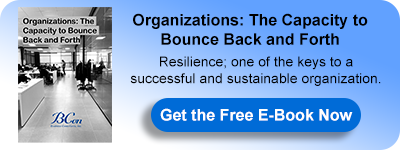Characteristics of a Resilient Organization
Five characteristics of resilient firms have been identified. Those characteristics enable and support nimble tactics, adaptive cultures, advanced technology installation, and effective utilization. Typically, businesses that can recover from unanticipated problems are:
1. Prepared
The most effective CXOs plan for both short- and long-term scenarios. More than 85% of CXOs in firms that adequately balance short- and long-term priorities felt their organizations had pivoted extremely effectively to adjust to the events of 2020. Still, less than half of organizations without that balance felt the same.
The companies that survived the pandemic the best have planned, creating processes to help workers redeploy to new roles, increasing their use of advanced technologies to create new market opportunities, developing new products and services, and providing employees with flexible work options.
It is recommended that organizations build thorough crisis-response scenarios and playbooks, frequently examining financial reserves, supply chain, and revenue sources, and investing in remote working structures to stay prepared for uncertainty.
2. Adaptable
Leaders understand the value of having people who can work in a variety of roles, especially after a year like 2020. To that end, CXOs ranked flexibility/adaptability as the most important workforce quality for their companies' long-term success.
Your investment in modern technology that aids flexibility is another factor that contributes to resilience. Cloud, artificial intelligence (AI), quantum computing, blockchain, and the Internet of Things (IoT) are just a few of the tools. Such tools can help your company improve supply chain security and transparency, boost supply and demand predictability, raise revenue, and cut expenses.
3. Collaborative
CXOs emphasized the value of collaboration inside their firms, claiming that it accelerated decision-making, reduced risk, and promoted innovation. One of the top strategic activities taken by CXOs before and during 2020 was to break down divisions and increase collaboration.
Collaboration is essential within your company and with your partners, clients, and even colleagues from other industries. Nearly a third of CXOs polled expect almost a third of their workforces to work remotely permanently, underlining the need for seamless collaboration.
In recent years, the Power Corporation of Canada, a worldwide management and holding business, has been conducting frequent stress tests (including pandemic tests) to develop its reaction playbooks. The company's ability to quickly adapt successful actions and communicate its expertise across its holdings was aided by having plans in place.
4. Trustworthy
CXOs are aware of the difficulty of establishing trust. More than a third of CXOs who responded said they weren't sure if their companies had succeeded in building trust between executives and employees. Those who succeed emphasize better communication and transparency with key stakeholders and lead with empathy.
With the public's faith in government, the media, business, and other institutions to act responsibly and ethically eroding, having the trust of your employees, partners, customers, and peers is a crucial differentiator.
5. Responsible
The majority of CXOs recognize that the corporate world has a responsibility that extends beyond the bottom line. Eighty-seven percent of polled CXOs stated their firms could quickly adjust and pivot in response to disruptive events because they had done a good job of balancing all of their stakeholders' needs. This is roughly 50 percentage points higher than the proportion of CXOs who answered the same thing at companies that haven't done a good job of balancing the needs of their stakeholders.
Businesses that are devoted to DEI (Diversity, Equity, and Inclusion) and rooting out people and processes that impede that commitment are also more resilient—possibly because they have a diverse variety of viewpoints to encourage innovative thinking and nimble action.
Authenticity also aids in the development of resilience. Among those who stated their firms build resilient cultures, 82 percent said they have a reputation for appreciating employees, 79 percent said they've demonstrated transparency with ESG concerns, and 78 percent said they have a reputation for assisting the community.
Most resilient businesses pay attention to all of these characteristics to some extent, rather than just one or two. This is partly because these traits frequently overlap and complement one another. Companies that practice stakeholder capitalism, for example, are likely to prioritize trustworthiness and ethical behavior.
Furthermore, these five characteristics are neither unchanging nor spontaneous. To cultivate and nurture them, you'll need desire, effort, investment, and action. According to the Deloitte Global Building Resilience report2, firms that intentionally incorporate these characteristics into their attitudes and cultures are better positioned to weather disruptions and bring in a "better normal" post-pandemic.
CXOs who said their organizations did a good job of creating resilient cultures, for example, were about three times more likely than those who said their organizations didn't do a good job of cultivating resilient cultures to say they endured the events of 2020 well.
1Deloitte, 25 Jan 2021, Punit Renjen, Building the resilient organization, Accessed 8 Mar 2022, https://www2.deloitte.com/xe/en/insights/topics/strategy/characteristics-resilient-organizations.html HBR, 12 Mar 2021, Five Traits of Resilient Organizations, Accessed 8 Mar 2022, https://hbr.org/sponsored/2021/03/5-traits-of-resilient-organizations
2 Deloitte, 25 Jan 2021, Punit Renjen, Building the resilient organization, Accessed 8 Mar 2022, https://www2.deloitte.com/xe/en/insights/topics/strategy/characteristics-resilient-organizations.html
For more about this topic, download our latest book " Organizations: The Capacity to Bounce Back and Forth " for FREE:
